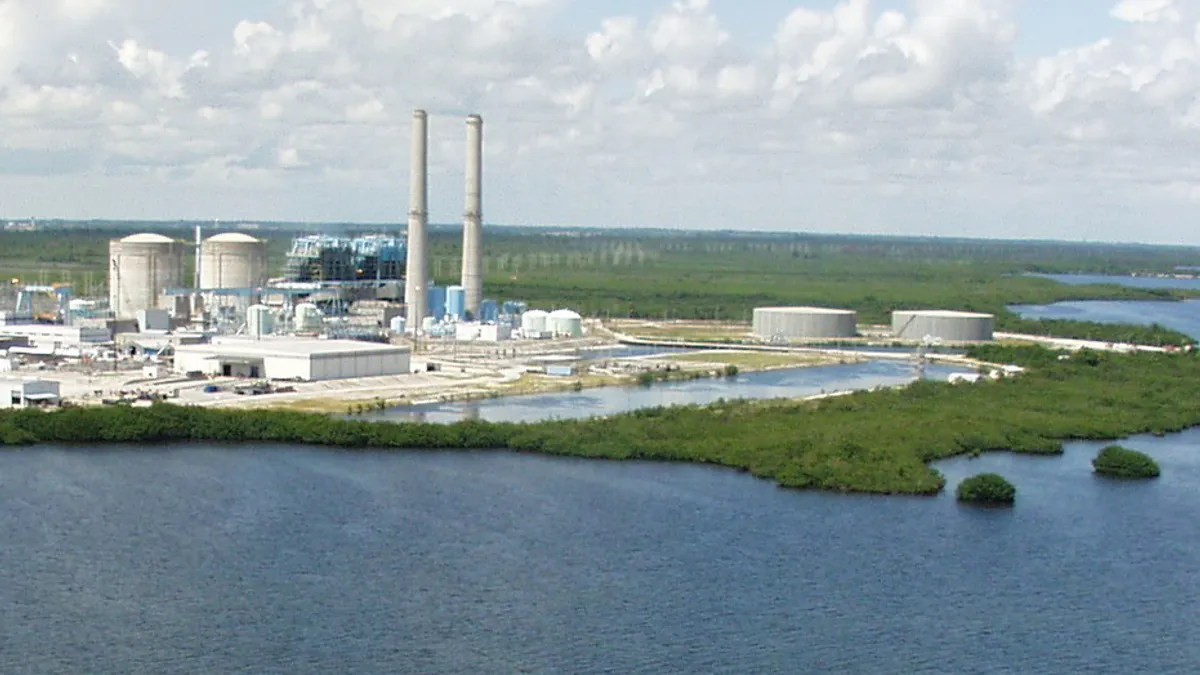This story has been updated with responses from Florida Power & Light and Friends of the Earth
Dive Brief:
- The Nuclear Regulatory Commission (NRC) on Wednesday authorized a subsequent license renewal for two units of the Turkey Point Nuclear Generating facility in Florida, marking the first time a reactor's lifespan has been extended from 60 to 80 years.
- Units 3 and 4 of the nuclear facility, located 20 miles south of Miami, are now licensed until July 19, 2052, and April 10, 2053, respectively.
- Nuclear advocates hailed the decision as a "significant milestone" in the industry's history, and an important part of decarbonization efforts. But a spokesman for Friends of the Earth called the decision “an example of the complete failure of the regulator to do its job.”
Dive Insight:
The majority of nuclear power plants in the U.S. are currently on a renewed license — extending their initial 40-year operational lifespan to 60 — but as more reach the 60-year mark, the NRC is gearing up for "subsequent license renewals," which would authorize the plants to operate for another two decades.
In July 2017, the agency issued guidance on its process for evaluating subsequent license renewals, which closely mirror regulations for earlier renewals: a 45-day period during which the agency determines whether an operator's license is complete, followed by extensive safety and environmental impact assessments. However, the agency shortened the review period from 22 months to 18 months.
Florida Power & Light (FPL) filed an application for subsequent license renewal with the NRC in January 2018, making it the first utility to seek a second 20-year license extension. The units' previous licenses were scheduled to lapse in 2032 and 2033.
The agency issued its final safety evaluation report on the facility in July, concluding that FPL had met the required safety regulations, and an environmental impact study in October. That report found the impacts of continuing to operate the units "are so limited that preserving the renewal option for energy planning decision-makers would not be unreasonable."
The NRC's decision to extend the operating license for Turkey Point Units 3 and 4 is "a significant milestone for the U.S. nuclear industry and essential to the continued availability of this carbon-free source of energy," Maria Korsnick, President and CEO of the Nuclear Energy Institute, told Utility Dive in an email.
"As America's largest source of carbon emissions-free power, keeping our nuclear plants operating is a critical factor in meeting climate and energy goals," she added.
Craig Piercy, CEO of the American Nuclear Society, also hailed the decision.
"The men and women of the American nuclear community applaud NRC and Florida Power and Light for the successful subsequent license renewal of Turkey Point. This is a truly significant step in the fight to preserve our nuclear fleet and decarbonize our electricity sector," he said in an email.
The Sierra Club, which says it is "unequivocally opposed to nuclear energy," did not immediately respond to a request for comment.
The NRC’s decision is a “major milestone for the continued production of affordable, reliable and clean nuclear power in Florida,” FPL spokesman Peter Robbins told Utility Dive in an email, adding that the extension was granted in part because of the utility’s investments in upgrades at the facility.
Nuclear power "is responsible for a significant portion of FPL's power production," and the utility's carbon dioxide emissions rate is about 30% better than the industry average, he said.
But Damon Moglen, senior strategic advisor of the Climate and Energy Program at Friends of the Earth, called the development “a licensing disaster waiting to happen.” The Turkey Point facility remains vulnerable to climate change, he said, and the region is expected to experience rising sea levels by the 2050s.
“This decision in no way serves the public and the environment, it only serves the interest of a very precise industry looking to protect its profits,” he said.














